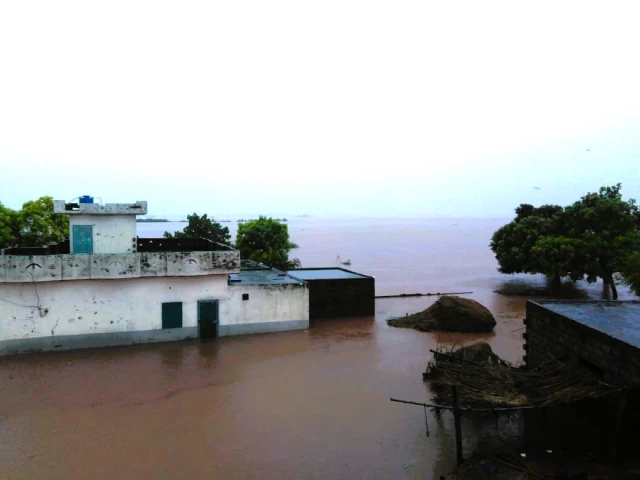For the past few weeks, floods have swept across northern Pakistan, submerging countless villages and leaving families devastated. Sialkot, my own hometown, was not spared. While my family has now moved to the main city, my childhood home — my father’s ancestral house, the place where we gathered on every Eid, every wedding, every celebration — still stands in Sadar Pura, Bajwat, near the Chenab River and the border.
On Tuesday night, the flood reached there.
What my relatives and neighbors went through is something I can hardly put into words. They told me how, in the middle of the night, they suddenly felt water rising under their feet. Within minutes, half of their bodies were submerged. Panic spread as they shouted warnings to each other, trying desperately to wake up their families before it was too late. The water came partly from heavy rains, but largely because India suddenly released excessive water into the Chenab, leaving people on our side with little time to prepare or even gather their belongings.
Those two nights, Tuesday and Wednesday, were nothing short of horrific. In villages like ours, homes are usually single-storied. When the water entered, families had no higher place to climb to. Many spent the night out in the open, under heavy rain, with children and the elderly trembling in the cold. Some carried whatever they could on their heads, a few clothes, a blanket, or an animal they were able to save. Others simply stood in shock, watching everything they owned disappear beneath the water.
The damage is beyond comprehension. Entire stocks of rice, stored carefully by farming families for the year ahead, were destroyed. Cattle, the backbone of the village economy, drowned before their owners’ eyes. The very fields that fed hundreds of families now lie buried under layers of mud and debris. For most households in Bajwat, farming and livestock are not just livelihoods, they are survival itself. And now, they have nothing left to fall back on.
My own barri Ammi and barray Abbu, who stayed behind in the ancestral house, have lost more than possessions. They have lost the sense of safety that every home should provide. Today, villagers struggle without even basic clothing. Food is scarce. Clean drinking water is hard to find. Waterborne diseases are spreading fast in the stagnant floodwater, and with little medical care available nearby, even minor illnesses could become life-threatening.
I write this not just as an observer but as someone tied by heart to these people. Though my parents moved us to Sialkot city so I could pursue better education, my roots remain in that village. I am now a third-year MBBS student in Lahore. My dream has always been to return one day as a doctor to serve the people of my village, who raised me with their prayers, kindness, and love. But watching them in such unimaginable pain has left me shaken in a way I cannot ignore.
These are not strangers in distant flood-hit areas. These are our people. Our neighbors. Our families. When they lose their homes, their crops, and their animals, it is not just individual losses; it is an entire community’s future being swept away. And yet, outside the flood zone, life goes on as usual. News reports mention the number of villages affected or the acres of land destroyed, but they rarely capture the human side: the grandmother who cannot find her medicines, the father who no longer has rice to feed his children, the young student who has lost all her schoolbooks in the water.
Rebuilding their lives will take decades. They need shelter, clean water, food, clothing, and medical support. But more than that, they need us to acknowledge their struggle and not let their voices fade away after the water recedes. The world quickly moves on to the next crisis, but for those who have lost everything, recovery is painfully slow.
I am sharing this story because disasters like these are too often reduced to numbers and statistics. Behind every “flood affectee” is a family that once lived with dignity, a farmer who once had crops, a mother who once had milk to feed her child. Today, they are left with nothing.
Let us not look away. Let us remember that in times like these, even a small act of kindness such as a donation, a shared resource, a helping hand can mean the world to someone who has lost everything.



COMMENTS (5)
Comments are moderated and generally will be posted if they are on-topic and not abusive.
For more information, please see our Comments FAQ